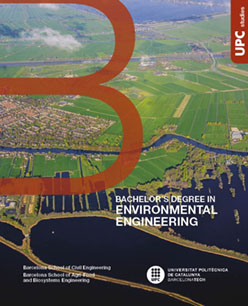Bachelor's degree in Enviromental Engineering
Barcelona School of Civil Engineering (ETSECCPB)
Barcelona School of Agri-Food and Biosystems Engineering (EEABB)
The actions of industry and economic and social activities influence and directly or indirectly affect the environment and quality of life.
In coming years, societies must face climate and environmental challenges and will require professionals with a scientific grounding and global awareness of how the planet works, in physical, chemical, geological and biological terms, who can foresee and provide solutions for these challenges.
With the bachelor's degree in Environmental Engineering, you will become part of a profession that has a great future and impact, because you will work on designing new production processes that help to control and mitigate environmental problems and to conserve natural resources by means of clean energy and technologies.
In the fourth year you will be able to choose one of the two mentions that are offered: Urban and Industrial Environment or Natural Environment and Global Change.
In coming years, societies must face climate and environmental challenges and will require professionals with a scientific grounding and global awareness of how the planet works, in physical, chemical, geological and biological terms, who can foresee and provide solutions for these challenges.
With the bachelor's degree in Environmental Engineering, you will become part of a profession that has a great future and impact, because you will work on designing new production processes that help to control and mitigate environmental problems and to conserve natural resources by means of clean energy and technologies.
In the fourth year you will be able to choose one of the two mentions that are offered: Urban and Industrial Environment or Natural Environment and Global Change.
- Professional opportunities
- As a graduate in Environmental Engineering, you will be able to practise professionally at companies and institutions that work to protect the environment, control environmental management plans, soil treatment and land restoration and the design of clean technologies, and carry out environmental impact studies, among others.
- Managers and specialists in industry, engineering, administration and services.
- University lecturers.
- Freelancers.
- Researchers.
- Companies: heads of environment and quality departments; implementation of quality standards (ISO, EMAS); environmental auditing.
- Engineering offices, on projects related to minimisation of emissions and treatment of gases; recovery of degraded spaces; soil treatment; design and operation of industrial and urban wastewater and drinking water treatment plants; industrial and urban solid waste treatment plants.
- Environmental consultancies, on studies related to environmental diagnosis and environmental management plans for companies; waste minimisation and recycling (IPPC directive); proposals for clean production technologies; environmental impact studies.
- Administration: technical consulting; municipal bureaus, provincial governments; natural area management plans; environmental regulations and auditing.




